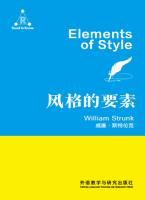风格的要素书评
林丽芳
The book "Elements of Style" succinctly explains the
requirements that must be followed to form an English writing style in a
concise and interactive manner between Chinese and English. From
punctuation to sentence paragraphs, the language is clear and logical,
covering knowledge, rich and practical, making it deeply touching to
read. In the preface, the book humbly states that "this book only
covers a small part of English writing style." The author's
experience is that "after mastering these basic elements,
one-on-one guidance can be provided for individual writing problems to
benefit students the most. In addition, each teacher has their own
writing theory, which is more respected than any textbook
recommendation." It can be seen that this book is not only a
grammar knowledge book for English writing style, but also a
foundational element for student writing style and a guide for teacher
writing theory. Therefore, the author points out that the content in the
book is rich and detailed, but there is no lengthy discourse. The only
examples are also used as supplements. In addition to the content in the
book, there are many works related to English writing and its style for
reading, learning, and thinking. However, for me, it is precisely
because I have just entered the field of English writing style that I
need this book "Elements of Style" even more. Reading and
learning this book not only makes up for my shortcomings in the basic
rules of English writing style, but also enables me to better find my
own English writing style in future English writing learning.
Furthermore, it also has a guiding role for my future career in adapting
to the reform of English basic education. Here, I am very happy to share
the wonderful content I have read in the book. In Rule 3 of Chapter 1,
the author separated the insertion with a comma and wrote, "This
rule is not easy to apply because it is often difficult to determine
whether a word (such as' how ') or a phrase is considered an insertion.
If the interference of the insertion element on the fluency of the
sentence is minimal, the author can safely omit the comma." When
certain conventional language expressions trouble second language
learners, effective expression can jointly facilitate learners and
professors, which also reflects the author's identity as a teacher.
Perhaps during our translation class, we were impressed by the idea that
the teacher often uses passive language in English while using active
language in Chinese. But the author points out in Chapter 2 that one of
the rules in English writing is to use active voice, which can make the
article more powerful, lively, and interesting. Later, the author also
pointed out in Rule 17 that one tense should be consistently used in the
overview. Effectively made me realize the current writing
misconceptions. Not to mention, the author has created a separate
chapter to emphasize "frequently misused words and
expressions.". Repeated use of "but" in writing can lead
to errors such as "loose sentences" or "missing
ends". At this point, restructuring sentence structures becomes an
effective way of writing. There are also words that are not suitable for
written expression in spoken language, some polysemy, ambiguity,
redundant words or phrases, etc. In Chapter 7, the author provides us
with opportunities to practice using typical example sentences and
paragraphs, which strengthens our memory and has the effect of reviewing
the old and learning new things. In summary, this book has brought me
not only knowledge of English writing style, but also the basic literacy
of English writing learners, the ability of teachers to impart
knowledge, and the misconceptions in English writing.




 京公网安备 11010802032529号
京公网安备 11010802032529号